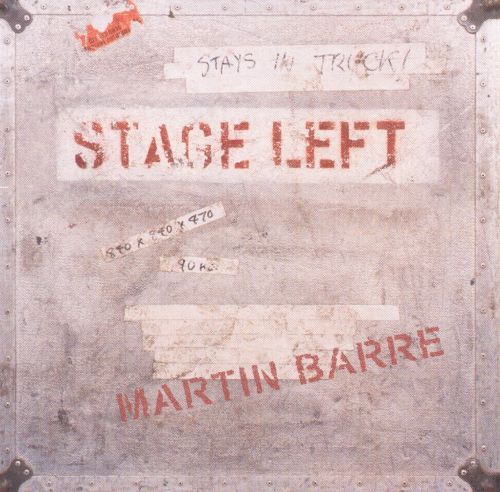Martin Barre will always be remembered as the right-hand of Ian Anderson in Jethro Tull. He had a large role in bringing to life the ideas and sordid cast of Ian Anderson’s characters. In the early 70s, he helped Anderson cry a song and gave us a riff which is now associated with a certain raspy-voiced homeless man. By the mid-70s a couple of Barre’s solo compositions made their way into Tull’s live set and some material into Tull’s studio work. An album comprised completely of his own material didn’t appear until 1994’s A Trick of Memory which was followed-up in 1996 by The Meeting.
And seven years later comes Stage Left. The title refers to Barre’s territory during Tull concerts. Opening the CD booklet, one might think that they’ve inadvertently bought a Steve Howe album. Each of the album’s 14 tracks features a different stringed instrument. Guitars of all sorts, mandolin, and bouzouki are thrown into the mix with a dash of flute. Yes, flute. Although Anderson is famous for his flute playing, Barre had been playing the instrument for some 10 years prior to joining Tull. And, if you caught Tull in concert this year, you probably saw him add some flute to “Fatman.” Joining him are a couple fellow Tullees: Jonathan Noyce on bass and Andrew Giddings on keyboards. Rounding out the band is Darrin Mooney on drums and Simon Burrett who sings on one track.
Despite being a mostly instrumental album by a guitarist, Stage Left does not suffer from cluttered arrangements or interminably long solos. None of the songs venture beyond the five minute mark but they’re all fleshed out with just enough twists and solos. Plus Barre throws in a number of acoustic songs which adds a great variety of timbres and moods.
In almost every interview, Barre describes his style as being a mix of blues and rock music. The opening song, “Count the Chickens,” is proof enough. It’s a fun romp with some bone-crunching riffs courtesy of the same Gibson Les Paul Junior used on Aqualung with Giddings’ organ filling in the spaces. Things settle down with “As Told By,” a lovely piece featuring multiple acoustic guitars.
“Favourite Things” features the bouzouki and has a strong Renaissance feel. It, along with the kinetic mandolin workout “D.I.Y,” bookend “After You, After Me” which wouldn’t have sounded out of place on Joe Satriani’s Flying in a Blue Dream. It’s a mid-tempo rocker with a wonderfully expansive melody. The song is dotted with short, mellow passages that add some welcome dynamics. When the main riff returns after each of these sections, it is a bit louder, a bit more forceful so the song builds up gradually throughout.
The album’s title track sounds most like a Jethro Tull song. It has flute on it, for one, but, as is common with Tull, slower acoustic passages are set against louder electric ones. In addition to guitar, Andy Giddings adds some understated yet very effective piano. Noyce’s bass is also great here with subdued parts give a nice, almost jazzy feel to the interludes. If anything, “Stage Left” goes to show that Barre has probably had a bigger hand in arranging Tull’s music than he’s given credit for.
“Winter Snowscape” also appears on the new Jethro Tull Christmas Album. The version here is sans flute giving Barre’s McCollum acoustic full license to paint the scene. The album should have ended with the jovial “I Raise My Glass to You” but, for some reason, vocals were given to “Don’t Say A Word” and it was tagged on to the end. Musically, the song is very much in line with the rest of the album but the vocals just seem so goofy and out of place.
This song aside, there aren’t any bad songs on this album. “A French Connection” may veer towards a sappy diet jazz at times, the song is redeemed once it gets moving again. The playing is uniformly great. Considering that he’s been performing with Noyce and Giddings for nearly eight years, it’s little wonder that their ensemble playing is always right on target.
Does it sound like Tull? Yes and no. Barre’s sound is as loud and brash as it has been since Tull’s Crest of a Knave but he throws in his own classical and blues influences that are normally a bit diluted in Tull’s songs. The arrangements are generally less complex but this isn’t really a bad thing. Without flute and voice, his talents step to the fore and he delivers the goods.
(This was originally published at The Green Man Review back in 2003-04.)

No comments:
Post a Comment